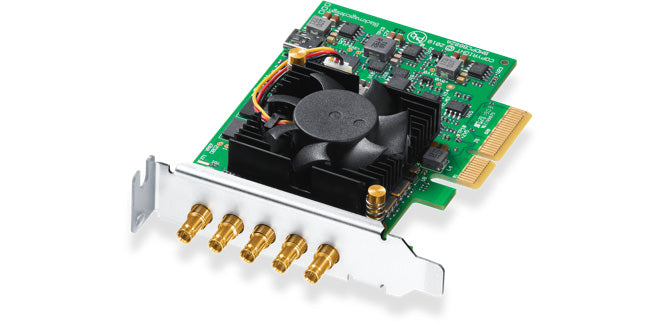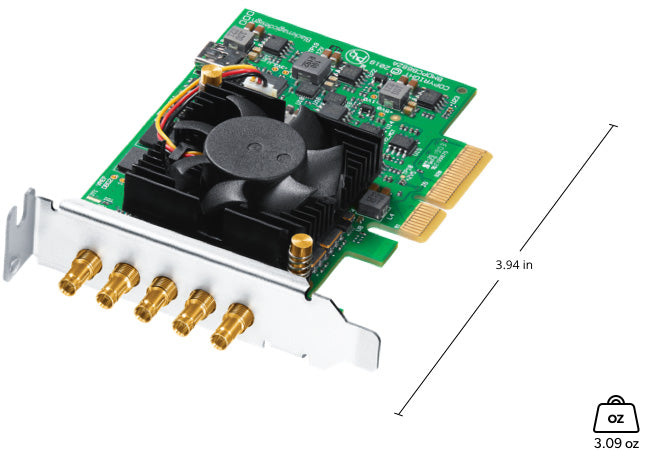Description
Featuring 4 independent 3G-SDI mini DIN connections, DeckLink Duo 2 Mini is a low profile, multi channel PCI Express capture and playback card that supports all SD and HD formats up to 1080p60! You get the flexibility of 4 separate capture or playback cards in one! Plus, it’s completely customizable so it’s perfect for media play-out systems, multi screen digital signage servers, real time multi channel capture systems and more!
Connections
SDI Video Inputs
4 x 3G-SDI mini DIN connections independently configurable as Input or Output and supports up to 12-bit SD and HD.
SDI Video Outputs
4 x 3G-SDI mini DIN connections independently configurable as Input or Output and supports up to 12-bit SD and HD.
SDI Audio Inputs
16 channels embedded in SD and HD.
SDI Audio Outputs
16 channels embedded in SD and HD.
Sync Input
Tri-Sync or Black Burst.
Computer Interface
PCI Express 4 lane generation 2, compatible with 4, 8 and 16 lane PCI Express slots.
Supported Codecs
AVC-Intra, AVCHD, Canon XF MPEG2, Digital SLR, DV-NTSC, DV-PAL, DVCPRO50, DVCPROHD, DPX, HDV, HEVC, XDCAM EX, XDCAM HD, XDCAM HD422, DNxHR & DNxHD, Apple ProRes 4444, Apple ProRes 422 HQ, Apple ProRes 422, Apple ProRes LT, Apple ProRes 422 Proxy, Uncompressed 8-bit 4:2:2, Uncompressed 10-bit 4:2:2, Uncompressed 10‑bit 4:4:4
Software
Software Included
Media Express, Disk Speed Test, LiveKey, Blackmagic Desktop Video Utility and Blackmagic driver on Mac OS and Windows. Media Express, Blackmagic Desktop Video Utility and Blackmagic driver on Linux.
Internal Software Upgrade
Firmware built into software driver. Loaded at system start or via updater software.
Physical Installation
PCI Express 4 lane generation 2, compatible with 4 and 8 lane PCI Express slots on Mac OS, Windows and Linux. Mac OS systems require a Mac Pro computer with PCI Express slots. Please check the Support pages to see the full system requirements.
Video Standards
SD Video Standards
525i59.94 NTSC, 625i50 PAL
HD Video Standards
720p50, 720p59.94, 720p60
1080p23.98, 1080p24, 1080p25, 1080p29.97, 1080p30, 1080p50, 1080p59, 1080p59.94, 1080p60
1080PsF23.98, 1080PsF24, 1080PsF25, 1080PsF29.97, 1080PsF30
1080i50, 1080i59.94, 1080i60
SDI Compliance
SMPTE 259M, SMPTE 292M, SMPTE 296M, SMPTE 372M, SMPTE 425M, ITU-R BT.656 and ITU-R BT.601.
SDI Metadata Support
RP 188/SMPTE 12M-2 and closed captioning.
Audio Sampling
Television standard sample rate of 48 kHz and 24 bit.
SDI Color Precision
8, 10, 12-bit RGB 4:4:4 in all modes up to 1080p30 and 8, 10-bit YUV 4:2:2 in all modes. 12-bit RGB 4:4:4 only supported in playback.
SDI Video Sampling
4:2:2, 4:4:4
Color Space
REC 601, REC 709
HDR Support
HDR static metadata packing, HLG and PQ transfer characteristics.
Processing
Colorspace Conversion
Hardware based real time.
HD Down Conversion
Built in, high quality software down converter on playback and capture. Down converted SD selectable between letterbox and anamorphic 16:9 styles.
HD Up Conversion
Built in, high quality software up converter from SD to HD on input. Selectable between 16:9 Zoom or anamorphic.
Cross Conversion
Built in, high quality software cross conversion from 720HD to 1080HD, 1080HD to 720HD on playback.
Real Time Effects
DaVinci Resolve, Final Cut Pro X internal effects. Adobe Premiere Pro CC Mercury Playback Engine effects. Avid Media Composer internal effects.
Environmental Specifications
Operating Temperature
5° to 40 ° C (32° to 104° F)
Storage Temperature
-20° to 45° C (-4° to 113° F)
Relative Humidity
0% to 90% non-condensing
What's Included
DeckLink Duo 2 Mini



